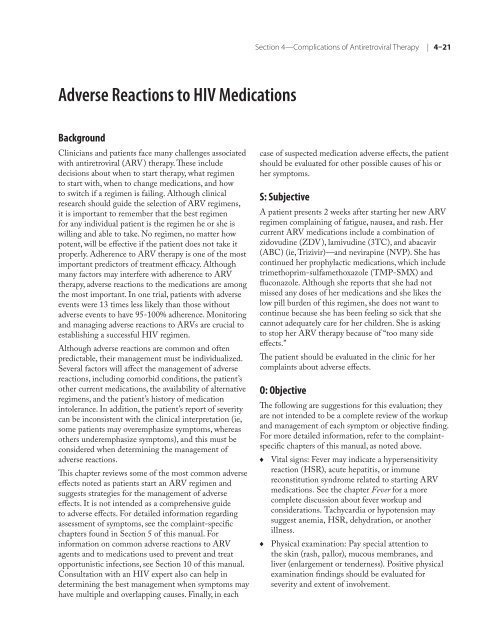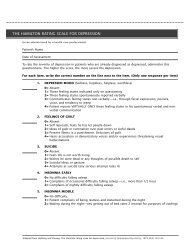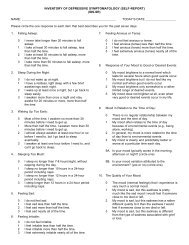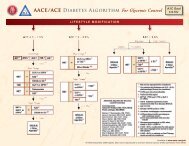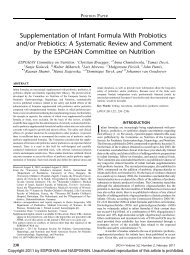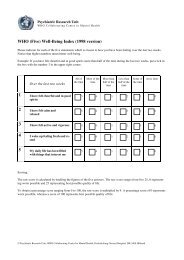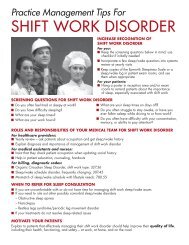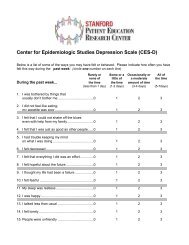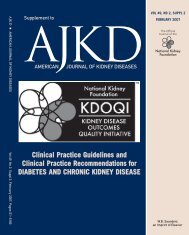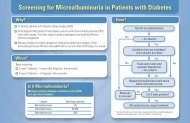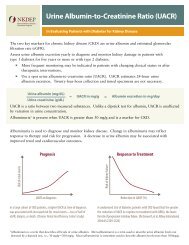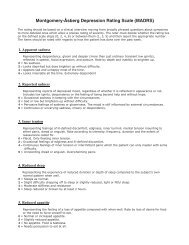Clinical Manual for Management of the HIV-Infected ... - myCME.com
Clinical Manual for Management of the HIV-Infected ... - myCME.com
Clinical Manual for Management of the HIV-Infected ... - myCME.com
You also want an ePaper? Increase the reach of your titles
YUMPU automatically turns print PDFs into web optimized ePapers that Google loves.
Adverse Reactions to <strong>HIV</strong> Medications<br />
Background<br />
Clinicians and patients face many challenges associated<br />
with antiretroviral (ARV) <strong>the</strong>rapy. These include<br />
decisions about when to start <strong>the</strong>rapy, what regimen<br />
to start with, when to change medications, and how<br />
to switch if a regimen is failing. Although clinical<br />
research should guide <strong>the</strong> selection <strong>of</strong> ARV regimens,<br />
it is important to remember that <strong>the</strong> best regimen<br />
<strong>for</strong> any individual patient is <strong>the</strong> regimen he or she is<br />
willing and able to take. No regimen, no matter how<br />
potent, will be effective if <strong>the</strong> patient does not take it<br />
properly. Adherence to ARV <strong>the</strong>rapy is one <strong>of</strong> <strong>the</strong> most<br />
important predictors <strong>of</strong> treatment efficacy. Although<br />
many factors may interfere with adherence to ARV<br />
<strong>the</strong>rapy, adverse reactions to <strong>the</strong> medications are among<br />
<strong>the</strong> most important. In one trial, patients with adverse<br />
events were 13 times less likely than those without<br />
adverse events to have 95-100% adherence. Monitoring<br />
and managing adverse reactions to ARVs are crucial to<br />
establishing a successful <strong>HIV</strong> regimen.<br />
Although adverse reactions are <strong>com</strong>mon and <strong>of</strong>ten<br />
predictable, <strong>the</strong>ir management must be individualized.<br />
Several factors will affect <strong>the</strong> management <strong>of</strong> adverse<br />
reactions, including <strong>com</strong>orbid conditions, <strong>the</strong> patient’s<br />
o<strong>the</strong>r current medications, <strong>the</strong> availability <strong>of</strong> alternative<br />
regimens, and <strong>the</strong> patient’s history <strong>of</strong> medication<br />
intolerance. In addition, <strong>the</strong> patient’s report <strong>of</strong> severity<br />
can be inconsistent with <strong>the</strong> clinical interpretation (ie,<br />
some patients may overemphasize symptoms, whereas<br />
o<strong>the</strong>rs underemphasize symptoms), and this must be<br />
considered when determining <strong>the</strong> management <strong>of</strong><br />
adverse reactions.<br />
This chapter reviews some <strong>of</strong> <strong>the</strong> most <strong>com</strong>mon adverse<br />
effects noted as patients start an ARV regimen and<br />
suggests strategies <strong>for</strong> <strong>the</strong> management <strong>of</strong> adverse<br />
effects. It is not intended as a <strong>com</strong>prehensive guide<br />
to adverse effects. For detailed in<strong>for</strong>mation regarding<br />
assessment <strong>of</strong> symptoms, see <strong>the</strong> <strong>com</strong>plaint-specific<br />
chapters found in Section 5 <strong>of</strong> this manual. For<br />
in<strong>for</strong>mation on <strong>com</strong>mon adverse reactions to ARV<br />
agents and to medications used to prevent and treat<br />
opportunistic infections, see Section 10 <strong>of</strong> this manual.<br />
Consultation with an <strong>HIV</strong> expert also can help in<br />
determining <strong>the</strong> best management when symptoms may<br />
have multiple and overlapping causes. Finally, in each<br />
Section 4—Complications <strong>of</strong> Antiretroviral Therapy | 4–21<br />
case <strong>of</strong> suspected medication adverse effects, <strong>the</strong> patient<br />
should be evaluated <strong>for</strong> o<strong>the</strong>r possible causes <strong>of</strong> his or<br />
her symptoms.<br />
S: Subjective<br />
A patient presents 2 weeks after starting her new ARV<br />
regimen <strong>com</strong>plaining <strong>of</strong> fatigue, nausea, and rash. Her<br />
current ARV medications include a <strong>com</strong>bination <strong>of</strong><br />
zidovudine (ZDV), lamivudine (3TC), and abacavir<br />
(ABC) (ie, Trizivir)—and nevirapine (NVP). She has<br />
continued her prophylactic medications, which include<br />
trimethoprim-sulfamethoxazole (TMP-SMX) and<br />
fluconazole. Although she reports that she had not<br />
missed any doses <strong>of</strong> her medications and she likes <strong>the</strong><br />
low pill burden <strong>of</strong> this regimen, she does not want to<br />
continue because she has been feeling so sick that she<br />
cannot adequately care <strong>for</strong> her children. She is asking<br />
to stop her ARV <strong>the</strong>rapy because <strong>of</strong> “too many side<br />
effects.”<br />
The patient should be evaluated in <strong>the</strong> clinic <strong>for</strong> her<br />
<strong>com</strong>plaints about adverse effects.<br />
O: Objective<br />
The following are suggestions <strong>for</strong> this evaluation; <strong>the</strong>y<br />
are not intended to be a <strong>com</strong>plete review <strong>of</strong> <strong>the</strong> workup<br />
and management <strong>of</strong> each symptom or objective finding.<br />
For more detailed in<strong>for</strong>mation, refer to <strong>the</strong> <strong>com</strong>plaintspecific<br />
chapters <strong>of</strong> this manual, as noted above.<br />
♦<br />
♦<br />
Vital signs: Fever may indicate a hypersensitivity<br />
reaction (HSR), acute hepatitis, or immune<br />
reconstitution syndrome related to starting ARV<br />
medications. See <strong>the</strong> chapter Fever <strong>for</strong> a more<br />
<strong>com</strong>plete discussion about fever workup and<br />
considerations. Tachycardia or hypotension may<br />
suggest anemia, HSR, dehydration, or ano<strong>the</strong>r<br />
illness.<br />
Physical examination: Pay special attention to<br />
<strong>the</strong> skin (rash, pallor), mucous membranes, and<br />
liver (enlargement or tenderness). Positive physical<br />
examination findings should be evaluated <strong>for</strong><br />
severity and extent <strong>of</strong> involvement.


